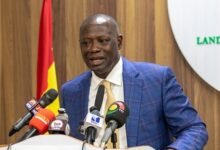
The Ghana Civil Society Organisations (CSOs) Platform on Sustainable Development Goals (SDGs) is calling for multi-partnership approach to enhance the implementation of the development goals particularly at the district level of governance.
At a news conference in Accra yesterday, the group indicated that four years into the implementation of the SDGs, progress was slow and there was the need for the countries to accelerate progress to make meaningful impact by 2030.
The meeting was part of activities to mark this year’s “Global Action Week” on the SDGs to drive action, raise awareness and hold leaders to account in tracking progress on the development goals.
It is also to rally public support for the SDGs, connecting actions taking place in thousands of cities and communities across the globe as world leaders gather in New York for the United Nations (UN) 74th General Summit on the goals.
Addressing journalists on behalf of the CSOs Platform, Mr Andrews Tagoe, Deputy General Secretary of the General Agricultural Workers’ Union of Ghana (GAWU) of the Trades Union Congress and Convener on Goal 8 of the SDGs deplored the little action taken by member countries to “live up to this bold ambition.”
In the Ghana context, Mr Tagoe observed that while there exist a strong national level institutional framework on the SDGs, coordination at the local level was weak as there is also low level of awareness and ownership of the goals by citizens.
“Ghana’s performance and progress are a mixture of successes and challenges. For instance, while significant progress has been made on areas like access to education, quality was still a concern.
“Though the country’s economic growth is acknowledged, it has not resulted in needed decent jobs. An appreciable proportion of Ghanaians believe that inequality was on the rise or that Ghana had stagnated in achieving equality, just to mention a few,” he said while presenting a shadow report on the progress of the SDGs by the Platform.
The Convener urged that all stakeholders step up awareness creation and public education campaigns on the SDGs as conscious attempts are made to “design and target interventions at public sector workers for them to relate their work to the SDGs.”
He also asked that immediate steps are put in place to improve coordination and multi-partnership collaboration as regional structures are roped into the implementation processes for maximum results.
Deputy Country Director of Korea International Cooperation Agency (KOICA), Ghana, Ms Jeongyi Choi, indicated that her agency had made it a priority to incorporate the goals in all its activities across its 44 offices around the world for peace and prosperity on the planet.
She urged member countries to continue to “synergise our efforts, engagements and partnerships in addressing these goals that affect all of us here.”
Meanwhile, UN Secretary-General António Guterres, in his remarks, at the Summit has urged Member States to live up to their commitments and called on all sectors of society to mobilise for the 2030 Agenda.
“We must step up our efforts,” he said. “Now is the time for bold leadership, both individual and collective,” he emphasized, calling for ambitious action by member states, local authorities, and the private sector, media, academia and young people to mobilise partnerships and hold leaders to account.
“We need to move together, leaving no one behind,” Mr Guterres charged in a statement issued yesterday.
Countries in 2015 unanimously adopted the 2030 Agenda for Sustainable Development – the most ambitious undertaking to transform our world to boost prosperity and ensure well-being for all while protecting the environment.
The Secretary-General’s annual progress report as well as the Global Sustainable Development Report by a group of independent scientists issued in advance of the Summit found that progress made so far is in danger of being reversed through worsening social inequalities and potentially irreversible impacts of climate change and biodiversity loss.
BY ABIGAIL ANNOH






